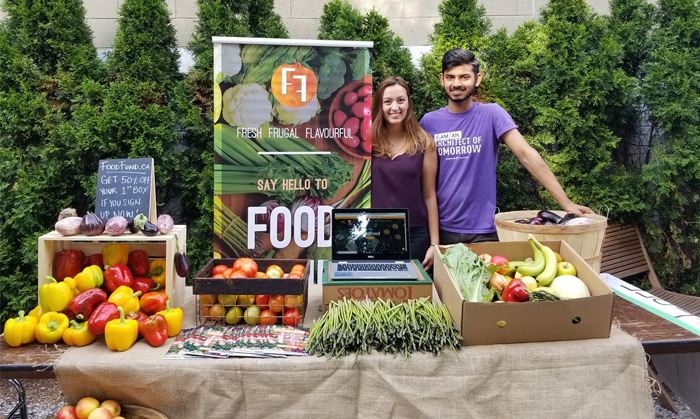Written by Laura Haggart
Time to read: 4 minutes
When HBA student Divyansh Ojha was 18 years old, he walked away from a coveted summer internship at a Big Five bank to pursue entrepreneurship. He didn’t have a team, funding, or a company name, but he did have an idea – and he was hungry to help.
Here’s what sparked the career pivot: Nearly 40 per cent of all food produced in Canada is wasted. Thousands of fruits and vegetables wind up in dumpsters every year because they don’t meet the cosmetic standards of grocery stores.
Meanwhile, one in eight people in Canada struggle to afford groceries and proper meals.
Two problems. One solution. Enter Ojha’s business idea: FoodFund.
FoodFund is an imperfect produce delivery service – think misshapen tomatoes, crooked carrots, and discoloured apples. The company sources, packs, and delivers farm fresh produce to customers’ doors every week.
“It’s not a business. It’s a movement,” Ojha said. “FoodFund is more than increasing bottom lines or growing revenues. Those aren’t the metrics we deal with. We look at how we can save more food, increase food security, and help more people.”
The seed of an idea
In December of 2016, the idea behind FoodFund started to take shape.
“My family and I were driving by a major retailer here in London,” Ojha recalled. “Someone was throwing a huge amount of food into the dumpster out back. And just a few hundred feet away, there was an older man with a sign making a plea for food. Why are we throwing away perfectly good food, when so many Canadians have nothing to eat?”
As a first-year Western student, Ojha didn’t think there was much he could do to help. It was an unsettling problem, but he was just a teenager and, as Ojha admits, he was “stuck in the pre-Ivey bubble.” For the next few months, he focused on his schoolwork and getting the perfect summer job.
“I landed a summer internship and forced myself into finance. That’s what a lot of entrepreneurs succumb to – that pressure to conform,” he said. “I started learning wealth management principles, and I thought to myself ‘I’m supposed to love this.’ But I knew it wasn’t my thing.”
Every day when he got home from work, his mind wandered back to the issue of food waste. He would research the problem, brainstorm potential solutions, and even sketch out a possible company logo.
He knew this was a problem he couldn’t ignore.
Ojha backed out of his internship seven weeks in, and dedicated the rest of his summer vacation to FoodFund. With the help of Ojha’s family and friends – specifically his parents, his cousin Aditya, and fellow HBA student Alysaa Co – FoodFund took off.
“I owe so much to my parents,” he said. “They have been by my side since the start.”
“FoodFund went from an idea on paper to delivering our first set of boxes in 52 days,” Ojha continued. “When things are supposed to be, they will be. It comes down to how much you believe in what you’re doing.”

FoodFund is an imperfect produce delivery service that sources, packs, and delivers farm fresh produce to customers’ doors every week.
Growing at Ivey
Ojha is just wrapping up his first semester of the HBA Program. He credits Western’s Management and Organizational Studies Program for the fundamentals to help get FoodFund up and running, and now Ivey has given him the tools to take it to the next level.
“Since starting Ivey in September, the amount I’ve learned has surpassed my first two years of undergrad,” he said. “I found a lot of value in our Communications and Leading People and Organizations courses. In the last few months, there have been major changes at FoodFund as a result. Way more than what I could’ve anticipated. I’m excited for what the second semester will bring.”
Ivey's HBA Program prepares students for success. Read what sets Ivey apart from other business schools.
Three bites of advice

There is no right time to start a business
“When you think it’s right, it’s right. Trust your gut.”

Always listen to your customers
“Listen to customers and potential customers. They will tell you how to successfully run your business. They’re the ones who will drive your business.”

Find unconventional ways of doing conventional things
“Here’s an example. To get customers, you don’t have to spend $10,000 advertising on Facebook. Posting to Facebook groups – that’s free, and it works.”